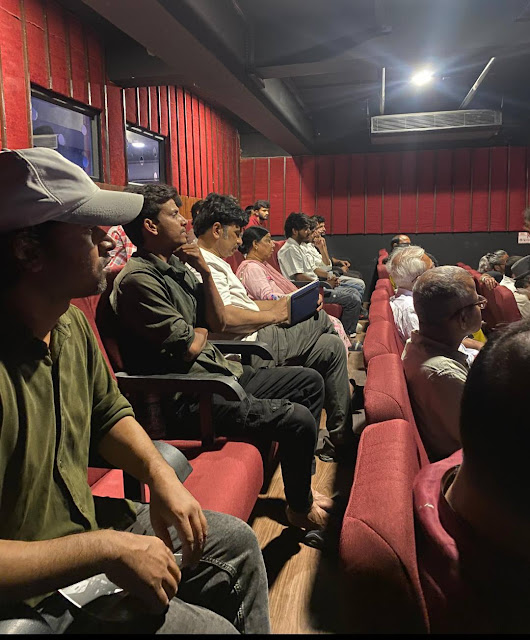पुस्तक-समीक्षा
"मुहब्बत का राबिता सिर्फ और सिर्फ रूह से है. शादी, ब्याह, निकाह .. इसका मुहब्बत से कोई लेना-देना नहीं. मुझे तुमसे न कोई गिला था... न है अविनाश, किसी नजर को तेरा इंतज़ार आज भी है." अविनाश की प्रेमिका नुसरत का प्रणय निवेदन और भी ज्यादा प्रासंगिक है जब कि उसकी पत्नी अंशु उसे छोड़कर किसी अमीर वरुण की शरण में जा चुकी है वह भी उसके सामने ही खुलेआम ऐलान करके.
भाषा में उर्दू के लफ्जों को जितनी खूबसूरती के साथ संस्कृतनिष्ठ शब्दों के साथ पिरोया गया है वह गंगा-जमुनी तहजीब की बेहतरीन मिसाल है. बीच-बीच में, लोगों की जुबां पर अब ही राज कर रहे पुरानी फिल्मी के कालजयी गीतों के बेहद प्रचलित बोलों का नायाब अंदाज में प्रयोग किया गया है जो पूरी तरह समीचीन भी है. जैसे- "तेरे बिना ज़िन्दगी से, शिकवा तो नहीं / तेरे बिना ज़िंदगी भी, लेकिन जिंदगी तो नहीं"
उपन्यास प्यार और यथार्थ के दो छोड़ों के बीच का आलोड़न है.
लेखक ने अपनी सिद्धस्थता का परिचय देते हुए इस उपन्यास को पूरी सफलता से तीन आयामों में उतारा है एक आयाम तो स्त्री-पुरुष संबंधों की व्याख्या का है वहीं दूसरा एकल परिवार की टूटन और उससे जनित परिस्थितियों का है जिसमें समय रहते चेते तो ठीक वरना सिर्फ खाई ही खाई है. तीसरा आयाम मिडिल क्लास फिनॉमेनन और हाई क्लास की लैविश लाइफ स्टाइल की अंतःक्रिया का.
स्त्री-पुरुष संबंधों के विश्लेषण में यह शारीरिक पक्ष का विस्तृत स्वरूप भी प्रस्तुत करता है जो विषयवस्तु की मांग है पर जो पक्ष ज्यादा हावी है वह है सामाजिक रुतबे का पक्ष. शारीरिक संतुष्टि तो अंशु को अविनाश ने अधिक दिया था पर वह उसके मिडिल-क्लास वाली सीमित जीवनशैली से परेशान थी. अब वरुण के पास है तो उसे उतनी शारीरिक संतुष्टि भी नहीं मिल रही है पर सामाजिक रुतबा तो ऊपर बढ़ रहा है. वरुण में संभवतः कोई शारीरिक कमी नहीं है पर मन से वह उससे जुड़ नहीं पाई है क्योंकि उसमें अविनाश जैसा भावोद्वेग नहीं है.
एकल परिवार को आज लोगों ने अपना लिया है संयुक्त परिवार की अवधारणा को छोड़कर पर क्या उसको भी निभा पा रहे हैं? मिन्नी जैसी प्यारी बेटी के रहते हुए भी अंशु का न सिर्फ ध्यान भटकता है बल्कि वह मिन्नी के पापा को छोड़कर किसी अन्य धनी वरुण की बाहों में जाने को आतुर है और चली भी जाती है. मिन्नी से उसे बेहद प्यार है, वह उसकी कमी को दूर नहीं कर पाती पर वरुण के बच्चे की माँ बनकर इस कमी को पाटने की कोशिश में लगी है. प्यार तो उसे अपने पति अविनाश से भी कम नहीं है पर वह प्यार सामाजिक रुतबे की कीमत पर जारी रखना उसके लिए एक घाटे का सौदा था.
मिन्नी बिचारी बिना किसी दोष के बीच में फंसी है और सबकुछ झेल रही है. वह खुशनसीब है कि उसे पिता का भरपूर प्यार मिल रहा है और पिता भी खुशनसीब है कि इस परिस्थिति में भी बेटी उसके साथ रहकर उसकी हौसला-अफजाई में लगी है. ध्यान दीजिए कि मिन्नी मात्र 13 साल की है फिर भी इतनी समझदार है कि पिता के इस हाल में साथ देने के लिए वह अपने रेजिडेंसियल स्कूल का परित्याग करके पिता के साथ उसके 1-बीएचके घर में ही रहने का निर्णय ले लेती है.
यह सारा कथानक उपन्यासकार ने अद्भुत सजीवता से साथ अंकित किया है.
यह उपन्यास आरम्भ से अंत तक पूरी तरह विषयकेंद्रित है, रत्ती भर भी विचलन नहीं है इसलिए सार-स्वरूप में है और कहीं भी बोझिल नहीं हो पाता.
घटनाक्रम इतने अधिक सहज और स्वाभाविक हैं कि उनमें कहीं कोई नाटकीयता या बनावटीपन का लेशमात्र भी बोध नहीं होता. आपको लगता है आप जैसे उनके दोस्त हों, सम्बन्धी हों और घट रही घटनाओं को अपनी आँखों से देख रहे हों.
एक चीज थोड़ी खटकी कि इस उपन्यास की नायिका जिस दूसरे प्रेम की और प्रस्थान कर रही है वह सहज सांवेगिक क्रिया नहीं है बल्कि अच्छी तरह से विचारित क्रिया है तो इसमें उसने कोई न कोई स्वतः निर्मित नैतिकता का सहारा अवश्य लिया होगा जिस पक्ष को पूरी तरह से अछूता रखा गया है मानो नारी मनमौजी ढंग से अनीति को अपना रही है.
इस कमी के वावजूद उपन्यास बेहद रोचक है जिसके पात्र बिना कोई हंगामा किये आपसी टकराहट को अंजाम देते हैं बिलकुल गले मिलते हुए से. उपन्यासकार का यह अंदाज बेहद अनूठा है और उपन्यास को एक अति मूल्यवान पठनीय कृति बना देता है.
इन सभी पक्षों को संश्लिष्ट रूप में देखें तो यह कृति उपन्यास कम और गद्य काव्य ज्यादा लगता है. "जिंदगी क्या शय है जिसका पता मिल ही नहीं रहा" नुसरत कहती है अविनाश को.
उपन्ययासकार की शैली ऎसी है मानों आप सिनेमा देख रहे हों. यह छोटा सा उपन्यास आपको तीन प्रकार के अनुभव एक साथ देता है - एक मंझे हुए लेखक के उपन्यास का, एक फ़िल्मी रोमांस का और एक भावपूर्ण लम्बी कविता का. इतनी बेहतरीन कृति के लिए रु. 250/= का मूल्य बिलकुल सही है जो छूट के साथ मात्र रु. 151/= में उपलब्ध है. (खरीदने हेतु लिंक नीचे)
समीक्षक : हेमन्त दास 'हिम'
प्रतिक्रया हेतु ईमेल : hemantdas2001@gmail.com
































































